
Due to the specifics of the business (development of the Help Desk system for automating B2B service support), we have to be as immersed in the topic of support in every sense of the word. Every day we communicate with hundreds of companies in Russia and the CIS, as a result, very often our communication goes beyond the scope of “automation” issues. That is why in 2017 we published our own study of the level of income in technical support , which became perhaps the first such serious and detailed industry-specific study of this kind in principle. In the report of this, 2019, we updated the data and tried to explain their changes qualitatively, based on a general idea of the market.
Instead of joining
There were no full-fledged analytical reports on how much specialists from a particular industry receive in two years. But today there is a mass of services in open access that build analytics based on the vacancies posted. Unfortunately, so far they have not developed enough to provide comprehensive data on our segment. In the best case, there will be analytics for a certain position (call-center operator, technical support specialist) without analyzing the requirements and level of training.
Against the background of other services, My Circle stands out, which builds its analytics not on the texts of published vacancies, but on the messages of employees. However, he has not so much data yet. At the time when we updated our report, for example, for the second half of 2019, only 55 profiles were collected for the post of technical support engineer. Therefore, we searched for our own numbers on services that aggregate personnel portal data.
This time we switched from calculating the number of companies to accounting for the number of vacancies . This is due to the abnormal situation in Moscow and the region, where according to the aggregation service, an average of 112 vacancies per company (compared to an average of 48 vacancies per company for the rest of Russia).
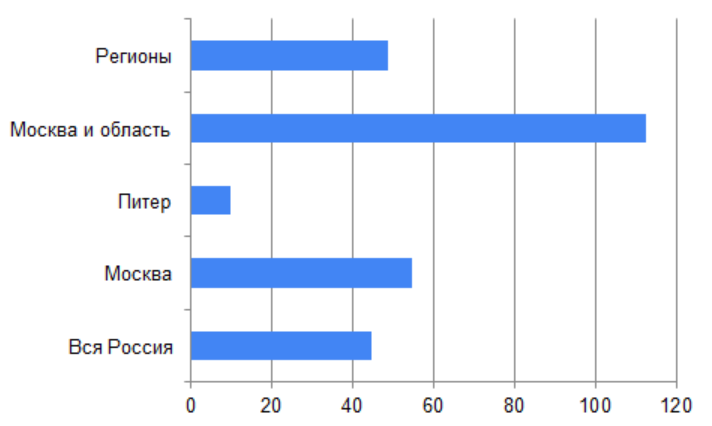
the number of vacancies per company for different regions
A total of 11,610 job vacancies in support across Russia were considered. This is about a quarter of the total number of vacancies without job restrictions. It is curious that the percentage of vacancy announcements in support against the general “labor” background in St. Petersburg is 2, and in Moscow, almost 3 times higher.
Of course, several ads can be published for the same vacancy (as well as vice versa - a single department can recruit one advertisement). So that this “noise” does not confuse us with numbers, then we proceed to the relative accounting of vacancies, instead of absolute.
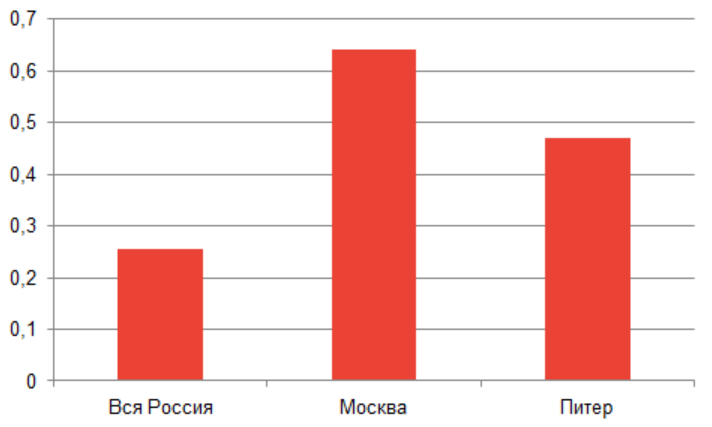
percentage of vacancies in support (of all published vacancies) by region
Approximately half of all vacancies published mention salaries . In Moscow, this share is slightly lower - 42%, and in St. Petersburg - slightly higher - 53% (against 51% on average in the country). It is significant that the share of ads with the specified income over the past 2 years has increased. Apparently, there is some kind of request for this information from candidates. But like two years ago, not all employers bother explaining whether the amount is indicated before or after taxes.
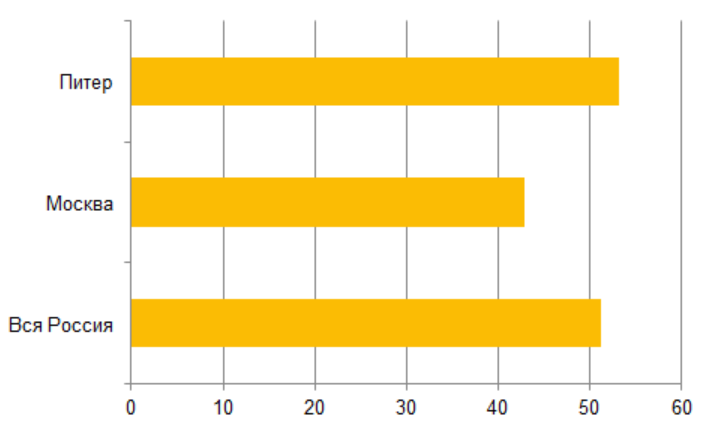
the percentage of vacancies indicating salary (relative to the total number of vacancies in this region)
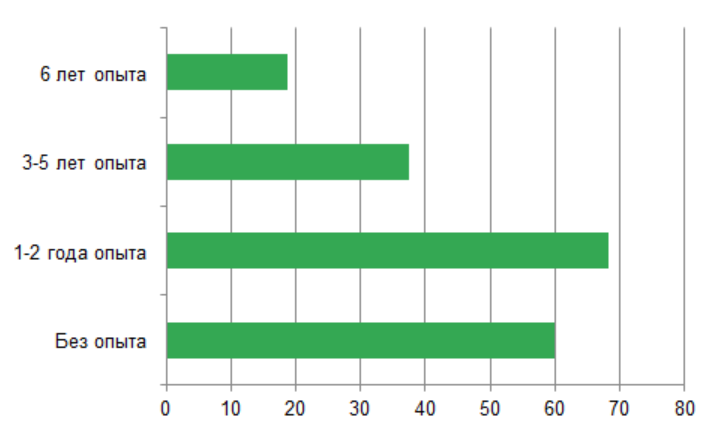
share of vacancies with salary, depending on level
On average, 82% of job postings in the country support the IT industry . Two capitals stand out against this background. In Moscow, the percentage of job postings in support in only 65% of cases relates to IT, in St. Petersburg - in 71% of cases.
Although the trend of remote work has recently been actively developing and promoting, and telephone support is just one of those professions that may not need an office, we have not found evidence that this format should be considered separately. Of the total number of vacancies that are clearly removed, vanishingly few. On average, there are slightly more than 3% of them in the country. In Moscow and St. Petersburg, even less - 1% and 2%, respectively. In reality, there are clearly more removed vacancies, apparently they are still poorly sorted by ad aggregators.
Support Classification
We considered the theoretical classification issues in detail in the last report . Recall that according to the profile of work, we separate “technical” (service) and “customer” support, and we also completely and independently distinguish between internal and external support.
Unfortunately, neither the first nor the second classifications have taken root among the personnel officers. So far, explicitly indicate in the ad customers ("customer support", "customer support") in only 13% of cases. It is impossible to evaluate the market share of customer support based on these data. Even less in the announcements of references to external and internal support is only a dozen vacancies across the country. Therefore, unlike the Western market, where such subtleties are taken into account when applying for a job, here the candidate has to study the list of required skills in order to understand what it is about.
For convenience of analysis, we share support by experience and skills. Do not confuse this classification with dividing by technical support lines - this is about another (about specific business processes built within a particular company).
Note that the experience and skills required for a particular vacancy do not always correlate with each other. This is partly due to the fact that not all ads are compiled correctly. And sometimes it is not clear what kind of experience is taken into account there: in the same position, in a similar company or overall work experience?
If you read the text of the vacancies, you can distinguish four levels, which we will talk about. And although the key point in this gradation is experience, the necessary condition for moving from one level to the next is the presence of additional skills that were not required before. To clarify the situation and obtain high-quality data, we selectively manually looked at about a hundred vacancies from each category (except for the last, where the offer is much smaller).
First level. Technical support without work experience
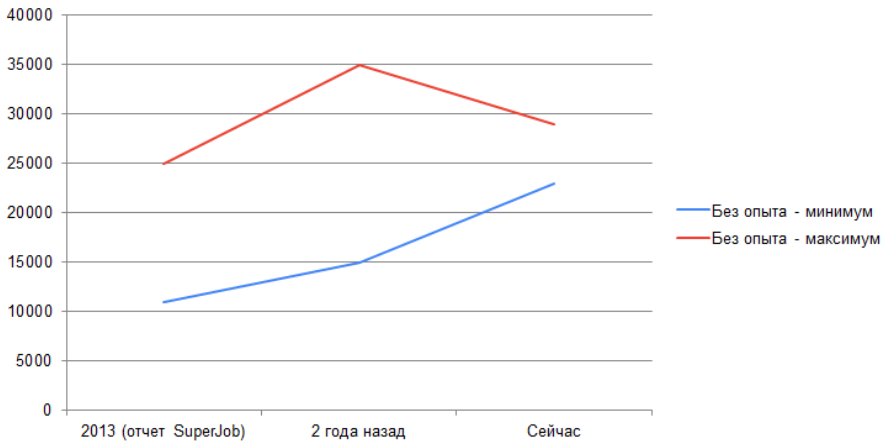
*** we changed the calculation method to cut off deliberate dumping from employers and overstatement of salaries due to incorrect positioning of the offer (or specialized industry), so the upper bar has decreased)
16% of all job openings in support across the country state that they do not require any work experience .
The list of requirements for candidates is mainly about emotions. They want to see a desire to work in them, a desire for professional growth and a young friendly team. Commonly mentioned:
- communication skills,
- desire and ability to communicate with people,
- normal diction
- stress resistance.
Technical skills are mainly limited to basic PC knowledge (confident user). By the way, two years ago in vacancies this knowledge was mentioned more often . Now more emphasis is placed on communication. This is probably a consequence of the development of onboarding processes in companies.
In part of the vacancies, education is indicated - secondary or incomplete higher (with the ability to combine work and study). Single employers require higher and even higher technical. Even less often, you need an elementary level of English.
Income at this level on average is 23 - 29 thousand rubles.
This is the average minimum and the average maximum of the declared income on hand (more about what these indicators are, we will stop further in the section on pitfalls). Closer to the minimum border are vacancies in the regions at outsourcing centers for processing incoming calls. A kind of first line, receiving calls. Higher income is offered in specific industries, although it is not always clear in such advertisements whether candidates without experience are really allowed (or implies a lack of experience in the industry).
This is not to say that first-level income has grown over the 2 years since the last report. Probably the amount received on hand, nevertheless increased, just the market forced to make ads more honestly.
For the candidate himself, work often begins with corporate training. Sometimes scholarships are paid, sometimes not. Even if she is paid, she is likely to be below the promised income in the announcement.
In addition to material compensation, at this level we are ready to offer:
- corporate training;
- mentoring;
- tea / coffee and cookies in the office;
- corporate discounts - company employees are offered discounts on their own services or partner services.
Rare jobs contain an extended list of bonuses:
- VHI - often not immediately, but after a year or two of work in the company, or only partially compensated;
- payment for meals (with certain restrictions);
- partial or full compensation for fitness (or a gym in the office);
- delivery, especially during shift work.
Many also boast of an intense corporate life, but without the details it is difficult to write down the pros or cons.
Another interesting observation: the overall impression of the market at the first level is essentially determined by the vacancies of large companies - mobile operators, banks, etc. Their ads are somewhat reminiscent of a constantly running creative competition with selling texts and pictures that depict happy people. At the next levels, one can no longer find such diversity.
Experience in technical support 1-2 years of work. Confident junior or almost middle
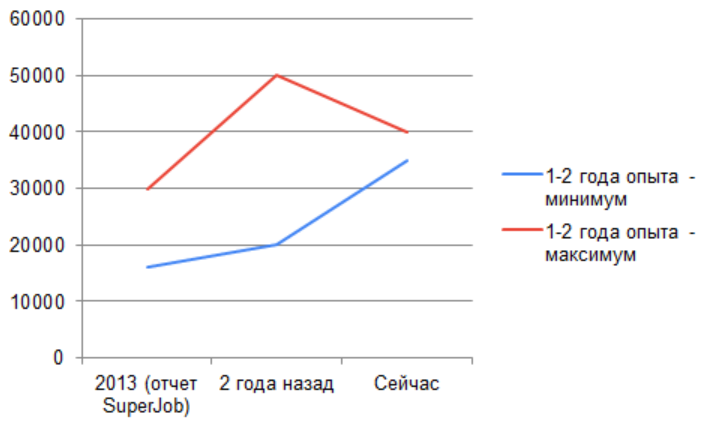
More than half of the vacancies in support (53%) are targeted specifically at such specialists . In reality, the figure is even higher, since some ads on the first level are actually focused on the second (just confusion with the stated experience).
At this level, employers are already more attentive to education. If the secondary special, then technical, preferably higher. Ads admitting incomplete higher less. The requirements for the English language are also more serious: reading English documentation is often necessary.
Some employers also highlight the essence of experience - it should be in a similar position or in a certain segment (for example, work experience in a call center). Individuals admit lack of official experience, but promise to stare at knowledge.
Among the required skills:
- the ability to work with tools used to automate support in a particular company (HelpDesk, etc., depending on the processes),
- knowledge of the operating principles of the OS (Windows or Linux, depending on the specialization);
- knowledge of technical terminology in a particular segment.
Often there is a need for:
- understanding of 1C and its specific configurations;
- knowledge of the principles of the LAN, protocols, equipment settings;
- basic knowledge of programming, testing and layout;
- administrative experience, in particular, remote access settings;
- skill setting tasks.
Income at this level is an average of 35-40 thousand rubles (this is the average minimum and the average maximum on hand) . This is slightly higher than the salaries indicated in our previous report.
The essence of the work is 1 or 2 support lines, more qualified user consultations. The more specific these consultations, the more money. Knowledge of English also raises income.
At this level, in terms of vacancies, trips appear (for which the requirements indicate a personal car and category B rights) and even business trips. In this case, the compensation received from the company is even higher, since travel expenses are being calculated, fuel and lubricant compensation.
The list of promises at this level is much less about a friendly team and corporate life, and the list of options is more concise:
- professional and career growth;
- corporate training, sometimes certification;
- Mobile Compensation
- tea, coffee, fruits and other buns in the office;
- VHI and sports (with milder conditions);
- corporate discounts.
By the way, a detailed description of vacancies is still preserved at this level, but personnel officers pay less attention to its compilation on average: the same formulations wander from announcement to announcement. And in some texts you feel painful experience for the company behind each wording (when, for example, it was mentioned in the text of one deleted job that work should not be combined with black and white magic). It was also striking that starting from this level, employers often mention a comfortable workplace and a convenient office among the pluses.
Subtotals
The salary market at the first two levels is most transparent , since the share of vacancies with the indicated salaries is significantly higher. Without work experience, salary is clearly indicated by 60% of employers, with experience of 1-2 years - 68%.
For 3-5 years of experience, salary appears in only 37% of vacancies, and if more than 6 years of experience is required, only 19% of employers will say about money . This is logical: the higher the specialist’s level, the more complex the processes involved. They are no longer so easy to value in money. During the interview, we are talking about attracting specific narrow specialists. Someone can be taken for a while, and for someone and overpay. The figure in the ad thus loses touch with reality.
For those who want to start working remotely in support, the first two levels are the most real. At the first, almost 7% of vacancies involve working at home with (in addition to the skills described above) a computer with constant access to the Internet and a headset. At the second level of removed vacancies 4%. The third and fourth levels are considered by remote workers only in 3% and 2% of cases, respectively. Perhaps they are recruiting them from already proven employees, or maybe they are not recruiting at all. At the same time, on average, the income promised in remote vacancies is lower than at similar positions in the office - employers are clearly trying to save money by transferring less qualified personnel outside the office.
It is curious that on average in IT, the view on a remote site is completely different - those who work more independently, and not June, are “released” to the house.
But for those who want to combine not very financial vacancies of several employers (which, in theory, can really be done on a remote site), not the best of times have come. Apparently, companies have already stepped on this rake, so that in many ads of the first and second level there is a mark that it is absolutely impossible to combine, which does not allow to increase a rather low income.
Technical support with 3-5 years of experience. Good middle
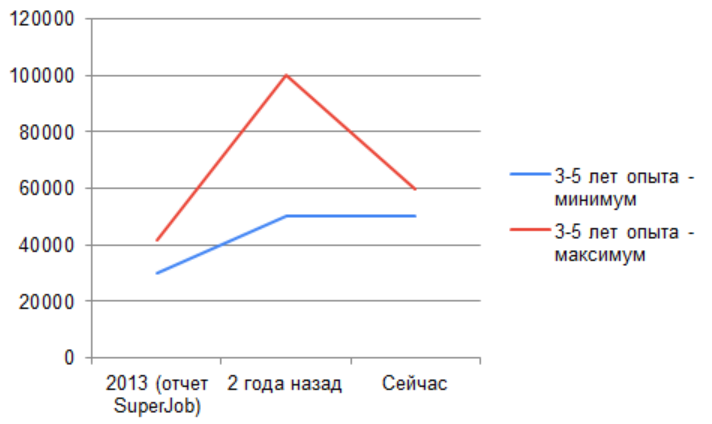
The total number of vacancies, where more than 3 years of work experience is required, is only 12% of the total number of ads. This is quite predictable: at this level, and the turnover is not so high, and there is someone to grow inside the company. The confusion, however, adds a different interpretation of the experience of personnel officers, which was noted above. Someone in a vacancy implies a general seniority, while someone means experience in a certain position or in a company of a given market segment. Unfortunately, these candidates have to deal with the text of the ads themselves.
Jobs at this level almost always require a higher technical education. In some cases, the economic one is also suitable - when it comes to servicing the same 1C. Many people need English at least at a level sufficient to read the documentation. Sometimes there is a request for spoken and written English. In terms of vacancies, the advantage will be certification passed, for example, according to ITIL .
The essence of the work by analogy with the first two levels can no longer be unambiguously described. Somewhere this is another software support line, in other places - field service of equipment, including specific. At the same time, positions can be called the same.
The required skills are determined by the nature of the work. Most vacancies mention:
- knowledge of the OS at the administrator level (Windows or Linux);
- network setup, office equipment, drivers;
- work with documentation (tender, drawings, instructions).
A further list of skills is subject to specialization. It can be:
- understanding of the principles of setting up telecommunication equipment;
- knowledge in the field of certain production processes and related equipment (for example, in the dairy industry or trade);
- configuration and maintenance of certain server products and OS (predefined Linux distributions);
- deeper knowledge of 1C and its configurations and related processes, for example, personnel records;
- understanding of basic network protocols and data exchange formats (XML, JSON).
Sometimes you need your own car and Category B. rights. But not every ad in the list of necessary mentions such skill as sociability - here it is no longer always necessary to contact customers or their representatives.
Average income - from 50 to 60 thousand rubles (average minimum and average maximum, respectively). Moreover, starting from this level, the difference in income between Moscow and other cities of the country becomes noticeable . Most cash vacancies are in the capital. However, the numbers are not published so much as to conduct a detailed analysis.
Depending on the nature of the work, at this level there are more vacancies with frequent business trips that increase income. There are also announcements about the recruitment of managers for a group of specialists or even an entire department. Naturally, the income on them is even higher, as is the responsibility. Specific skills - knowledge in narrow areas, in-depth knowledge in a certain segment (necessary for the company) also increase the “price” of a specialist.
Intangible incentives are generally consistent with promises for the previous level. In addition, the options required by employees with families are added:
- partial compensation for children's rest;
- financial support in case of life changes (wedding, childbirth, etc.).
Over 6 years of experience - at least senior
Although more qualified market specialists are clearly in demand, there are already very few vacancies at this level - just over 1% of the total support . At the same time, the salaries are indicated by units, as a result, for analysis, we have only 30 ads left (some of which obviously went the wrong way due to a flaw in the aggregator algorithm - for example, it is not clear where the “educator” came from).
At this level, higher technical education is required everywhere, sometimes with a certain specialization, and certification is often necessary. If we are talking about a leadership position, then we need the experience of a similar leadership - the implementation of processes, organization of activities, etc. When it comes to English, it is often necessary not only technical to read the documentation, but also conversational. In the list of personal qualities, communicativeness again appears, as well as general erudition not found at levels below.
The spread of salaries at this level is very large - from 60 to 100 or more thousand rubles (as before, this is the average minimum and average maximum). But there are ads up to 30 thousand and more than 150 thousand. The lower bar is determined by employers who for some reason want people with experience of more than 10 years to work on their first lines. From above, this range is “warmed up” by the vacancies of support managers and service centers. With such a difference in tasks and required skills, it is not possible to identify some general requirements for employers.
Intangible compensation in general does not differ from the previous level, but when studying ads, one promise caught my eye: the absence of a salary ceiling. Vacancies at previous levels did not talk about this.
Pitfalls of technical support
Like 2 years ago, I want to dwell separately on the pitfalls.
We promise a lot - pay less
Salaries are already indicated in more vacancies than 2 years ago, but not always honestly. As noted above, a total of 51% of announcements are being published with salaries (in the previous report there were 42%) .
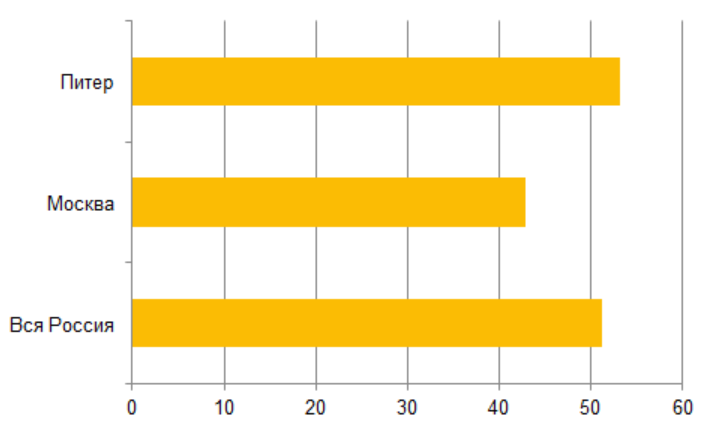
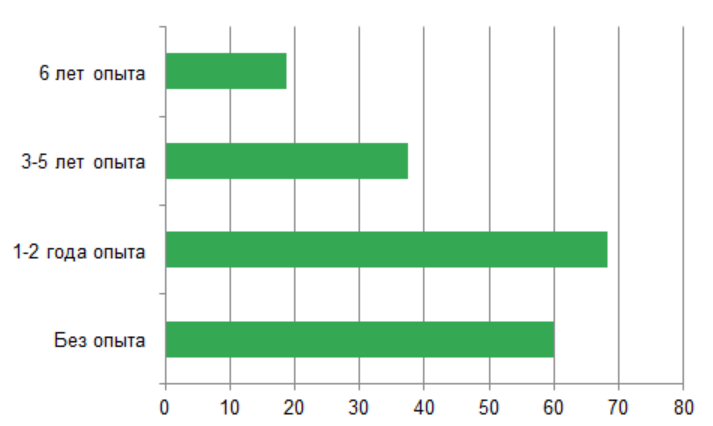
Often from the text of the announcement it is clear that there is a salary and bonuses that are paid not every time, but subject to the fulfillment of some standards or KPI. Or, the announcement clearly states that the first time due to the probationary period, internship or any other reason, the specialist will receive less. Even worse is the situation where the candidate seems to see a salary, but cannot calculate the real number, because (hereinafter referred to as the real quote):
“The salary level is discussed individually depending on professional competencies”
It is curious that some companies write down the indexation of salaries as a plus for the year as a plus.
In all these cases, the largest amount is used to classify ads on the personnel portal, which displays the vacancy higher when sorting by income. Probably, through frauds with figures, personnel officers want to attract more attention to their ad.
In this report, we tried to collect the most realistic figures: for each vacancy, we indicated the minimum and maximum that the employee can get into his hands. For example, if we are talking about a salary with a bonus, then the minimum is the salary “on hand”, and the maximum is the salary with the highest bonus (if its size was specified). The average minimum is the average minimum of all ads at the appropriate level. The average maximum is similar, but for the highest income.
It's time to learn to count
An interesting trend is vacancies, where a year of work is required, often fall into the category of “without experience”, although in fact there is a whole list of necessary skills. This is either an aggregation error, or the personnel officer tried to outwit even more cunning candidates. Say, they will be looking for work with experience greater than they have ... but here we are. And the salary against the background of “inexperienced” vacancies is higher.
It seems to us that it is time to abandon these frauds. At the first and second levels of qualification, everything is quite transparent - the announcement in any case in the eyes of the candidate will “fall out” of the big picture.
“Need a cleaner with two higher and knowledge of English” ...
(c) a joke from the 90s
Studying the texts of vacancies, we noticed obvious discrepancies. For example, people with only CRM experience were hired without experience. Or the first line of support for a simple answer by phone and redirecting the application required a candidate with experience of 10 years, including for the position of system administrator. In the place of the employee, we would not respond to such “self-consistent” announcements. But the employer wants to recommend an adequate look at their tasks and staffing needs.
Title Problem
Although human resources personnel are getting deeper and deeper into the IT segment to attract competent personnel, the confusion over the naming of posts in support only worsens over the years. Two years ago, we analyzed vacancies based on positions - operator, specialist, engineer, manager. Now it’s pointless to focus on them, because in some vacancies the operator and, say, the engineer differ from each other in terms of experience, and in other cases the fundamental differences are in the nature of the work (for some reason, engineers are recruited for field service, even without work experience, and specialists - for placement in the office). So if you are looking for work in this segment, use different query options.
Instead of totals
The market has changed ...
- There are more vacancies themselves, especially in the regions.
- In general, salaries for two years increased slightly, but not for everyone . At the lowest level (without experience), growth is almost zero. But the higher the specialist’s level, the more serious the growth. Unfortunately, in the last report we did not consider the qualified personnel in such detail, therefore, as a basis for assessing this growth, we can take only summary data for the second and third levels. Based on these data, the growth amounted to almost 19%. This is more than 2 times ahead of official inflation.
- Salaries in ads began to show more often . Although honestly did not learn to demonstrate it.
- The purely visual gap between the advertisements for hiring not very qualified personnel and the search for specialists with a narrow profile is becoming more and more. The former are flow-oriented: employers are trying to reduce the cost of hiring through beautiful pictures and photos of satisfied people, following the example of the “Work at McDonald's” advertisement. It’s like a B2C ad: “Buy our elephants.” Technical skills here go by the wayside: it’s easier to train than to look for something special. And the vacancies for experienced professionals have not changed - they are still dry, concise and contain a huge list of technical requirements (sometimes somewhat divorced from reality).
- The segment of remote work is growing, it is slowly but pulling up salaries in the regions. On the other hand, in megacities at some positions there is an overabundance of personnel - out of habit, people still go to Moscow for money.
Under the influence of these and other factors, the numbers and their ratios change. And we are sure that large-scale transformations are yet to come.
Today, like two years ago, it is not the one who competently settled down in the capital who earns money, but the one who has specific knowledge in a narrow area or combines seemingly incompatible segments. If only there was a demand for this combination.
Probably, the demand for narrow specialization is now the hard currency of the personnel market. It is unlikely that in the near future it will fall in price. But with other trends, we, along with hundreds of service companies from various industries that are Okdesk customers, will be happy to watch. Join now!